|
|
Creator | Title | Description | Subject | Date |
| 1 |
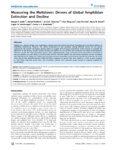 |
Sekercioglu, Cagan | Measuring the meltdown: drivers of global amphibian extinction and decline | Habitat loss, climate change, over-exploitation, disease and other factors have been hypothesised in the global decline of amphibian biodiversity. However, the relative importance of and synergies among different drivers are still poorly understood. We present the largest global analysis of roughly ... | | 2008-01-01 |
| 2 |
 |
Sekercioglu, Cagan | Habitat use and movements of native forest birds in southern Costa Rican agricultural countryside | We used radio telemetry to study the habitat use, activity budgets, and movements of three bird species that are found in native forest and coffee plantations of southern Costa Rica. We obtained 7522 locations from Turdus assimilis (n=27), Tangara icterocephala (n=53), and Catharus aurantiirostris (... | | 2003-01-01 |
| 3 |
 |
Sekercioglu, Cagan | Importance of Ethiopian shade coffee farms for forest bird conservation | Coffee is the most important tropical commodity and is grown in high-priority areas for biological conservation. There is abundant literature on the conservation value of coffee farms internationally, but there has been little research on this topic in Africa. Ethiopia is a diverse and little-studie... | | 2014-01-01 |
| 4 |
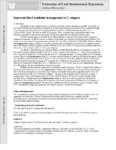 |
Jorgensen, Erik | Improved Mos1-mediated transgenesis in C. elegans | The ability to add or delete genes to the genome of genetic model organisms is essential. Previously, we developed methods based on the Mos1 transposon1 to make targeted transgene insertions (Mos1-mediated Single Copy transgene Insertions, MosSCI2) and targeted deletions (Mos1-mediated deletions, Mo... | | 2012-01-01 |
| 5 |
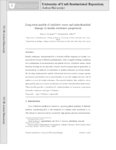 |
Adler, Frederick R. | Long-term models of oxidative stress and mitochondrial damage in insulin resistance progression | Insulin resistance, characterized by a reduced cellular response to insulin, is a major factor in type 2 diabetes pathogenesis, with a complex etiology consisting of a combination of environmental and genetic factors. Oxidative stress, which develops through an accumulation of toxic reactive oxygen ... | | 2014-01-01 |
| 6 |
 |
Beckerle, Mary C. | LIM proteins in actin cytoskeleton mechanoresponse | The actin cytoskeleton assembles into branched networks or bundles to generate mechanical force for critical cellular processes such as establishment of polarity, adhesion, and migration. Stress fibers are contractile, actomyosin structures that physically couple to the extracellular matrix through ... | | 2014-01-01 |
| 7 |
 |
Sekercioglu, Cagan | The effects of climate change on tropical birds | Birds are among the most widely studied organisms on earth and represent an important indicator group for learning about the effects of climate change - particularly in regard to the effects of climate change on tropical ecosystems. In this review, we assess the potential impacts of climate change o... | | 2010-01-01 |
| 8 |
 |
Adler, Frederick R. | Mathematical modeling the age dependence of Epstein-Barr virus associated infectious mononucleosis | Most people get Epstein-Barr virus (EBV) infection at young age and are asymptomatic. Pri-mary EBV infection in adolescents and young adults however, often leads to infectious mononucleosis (IM) with symptoms including fever, fatigue, and sore throat that can persist for months. Expansion in the num... | | 2012 |
| 9 |
 |
Potts, Wayne K. | MHC signaling during social communication | The major histocompatibility complex (MHC) has been known to play a critical role in immune recognition since the 1950s. It was a surprise, then, in the 1970s when the first report appeared indicating MHC might also function in social signaling. Since this seminal discovery, MHC signaling has been f... | | 2012-01-01 |
| 10 |
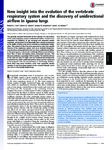 |
Cieri, Robert | New insight into the evolution of the vertebrate respiratory system and the discovery of unidirectional airflow in iguana lungs | The generally accepted framework for the evolution of a key feature of the avian respiratory system, unidirectional airflow, is that it is an adaptation for efficiency of gas exchange and expanded aerobic capacities, and therefore it has historically been viewed as important to the ability of birds ... | | 2014-11-17 |
| 11 |
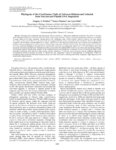 |
Bohs, Lynn A. | Phylogeny of the carolinense clade of solanum (Solanaceae) inferred from nuclear and plastid DNA sequences | The large and economically important genus Solanum contains ca. 1,400 species distributed worldwide. One of the 12-14 major clades identified in the genus is the Leptostemonum clade, or the "spiny solanums." Previous molecular phylogenetic studies have identified 14 major clades in the spiny solanum... | | 2014-01-01 |
| 12 |
 |
Adler, Frederick R. | Reply: | We appreciate the comments of Drs. Craig and Simpson and Drs. Mullins and Schwartz, and the challenge they raise to make MALD more believable, comprehensible, and usable. Acetaminophen (APAP) toxicity is indeed a complex process involving multiple steps. Although the underlying mathematics is more i... | | 2012-01-01 |
| 13 |
 |
Capecchi, Mario R. | Modeling alveolar soft part sarcomagenesis in the mouse: a role for lactate in the tumor microenvironment | Alveolar soft part sarcoma (ASPS), a deadly soft tissue malignancy with a predilection for adolescents and young adults, associates consistently with t(X;17) translocations that generate the fusion gene ASPSCR1-TFE3. We proved the oncogenic capacity of this fusion gene by driving sarcomagenesis in m... | | 2014-01-01 |
| 14 |
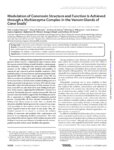 |
Olivera, Baldomero M. | Modulation of conotoxin structure and function is achieved through a multienzyme complex in the venom glands of cone snails | Background: Conotoxins can be utilized to investigate enzyme-assisted folding of disulfide-rich peptides. Results: Various ER-resident cone snail enzymes act in concert to accelerate the oxidative folding of conotoxins and modulate their conformation by reconfiguring disulfide connectivities. Conclu... | | 2012-01-01 |
| 15 |
 |
Parkinson, John Stansfield | Mutational analysis of the P1 phosphorylation domain in E. coli CheA, the signaling kinase for chemotaxis | The histidine autokinase CheA functions as the central processing unit in the Escherichia coli chemotaxis signaling machinery. CheA receives autophosphorylation control inputs from chemoreceptors and in turn regulates the flux of signaling phosphates to the CheY and CheB response regulator proteins... | | 2014-01-01 |
| 16 |
 |
Jorgensen, Erik | Nano-fEM: Protein localization using photo-activated localization microscopy and electron microscopy | Mapping the distribution of proteins is essential for understanding the function of proteins in a cell. Fluorescence microscopy is extensively used for protein localization, but subcellular context is often absent in fluorescence images. Immuno-electron microscopy, on the other hand, can localize pr... | | 2012-01-01 |
| 17 |
 |
Capecchi, Mario R. | Sepp1UF forms are N-terminal selenoprotein P truncations that have peroxidase activity when coupled with thioredoxin reductase-1 | Mouse selenoprotein P (Sepp1) consists of an N-terminal domain (residues 1-239) that contains 1 selenocysteine (U) as residue 40 in a proposed redox-active motif (-UYLC-) and a Cterminal domain (residues 240-361) that contains 9 selenocysteines. Sepp1 transports selenium from the liver to other tiss... | | 2014-01-01 |
| 18 |
 |
Farmer, Colleen G. | Unidirectional pulmonary airflow patterns in the savannah monitor lizard | The unidirectional airflow patterns in the lungs of birds have long been considered a unique and specialized trait associated with the oxygen demands of flying, their endothermic metabolism1 and unusual pulmonary architecture2,3. However, the discovery of similar flow patterns in the lungs of crocod... | | 2014-02-20 |
| 19 |
 |
Bohs, Lynn A. | Two new species from the brevantherum clade of solanum (solanaceae) from eastern Brazil | Two new species of Solanum (Solanaceae) from eastern Brazil are described. Solanum anisocladum Giacomin & Stehmann is similar to S. megalochiton Mart., but differs by the indument of the adaxial leaf surface, which is composed of long porrect-stellate and unbranched trichomes. It also has a more rob... | | 2013-01-01 |
| 20 |
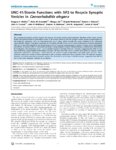 |
Jorgensen, Erik | UNC-41/stonin functions with AP2 to recycle synaptic vesicles in Caenorhabditis elegans | The recycling of synaptic vesicles requires the recovery of vesicle proteins and membrane. Members of the stonin protein family (Drosophila Stoned B, mammalian stonin 2) have been shown to link the synaptic vesicle protein synaptotagmin to the endocytic machinery. Here we characterize the unc-41 gen... | | 2012-01-01 |
| 21 |
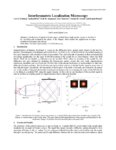 |
Jorgensen, Erik | Interferometric localization microscopy | Interference of signal in Fourier space, emitted from single probes, is used to localize it by recording and computing the phase of the fringes. Such system has applications in super resolution localization microscopy. | | 2014-01-01 |
| 22 |
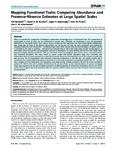 |
Sekercioglu, Cagan | Mapping functional traits: comparing bundance and presence-absence estimates at large spatial scales | Efforts to quantify the composition of biological communities increasingly focus on functional traits. The composition of communities in terms of traits can be summarized in several ways. Ecologists are beginning to map the geographic distribution of trait-based metrics from various sources of data,... | | 2012-01-01 |
| 23 |
 |
Beckerle, Mary C. | Mathematical modeling of the dynamic mechanical behavior of neighboring sarcomeres in actin stress fibers | Actin stress fibers (SFs) in live cells consist of series of dynamic individual sarcomeric units. Within a group of consecutive SF sarcomeres, individual sarcomeres can spontaneously shorten or lengthen without changing the overall length of this group, but the underlying mechanism is unclear. We us... | | 2014-01-01 |
| 24 |
 |
Adler, Frederick R. | Mathematical modeling of liver injury and dysfunction after acetaminophen overdose: early discrimination between survival and death | Acetaminophen is the leading cause of acute liver injury in the developed world. Timely administration of N-Acetylcysteine (N-Ac) prevents the progression of serious liver injury and disease, while failure to administer N-Ac within a critical time frame allows disease progression and in the most sev... | | 2012-01-01 |
| 25 |
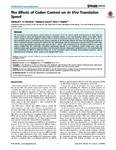 |
Hughes, Kelly T. | The effects of codon context on in vivo translation speed | We developed a bacterial genetic system based on translation of the his operon leader peptide gene to determine the relative speed at which the ribosome reads single or multiple codons in vivo. Low frequency effects of so-called ‘‘silent'' codon changes and codon neighbor (context) effects could... | | 2014-01-01 |

























